Small businesses need reliable cloud storage to manage data securely, collaborate effectively, and scale with ease. Here are five leading tools to consider:
- Microsoft OneDrive for Business: Affordable plans starting at $5/user/month with seamless integration into Microsoft tools and strong security features.
- Google Drive for Business: Part of Google Workspace, offering plans from $6/user/month with excellent collaboration features and cross-platform accessibility.
- Dropbox Business: Known for file syncing and team collaboration, starting at $15/user/month with advanced sharing tools.
- Box: Focused on security and compliance, ideal for regulated industries, with plans starting at $5/user/month.
- Backblaze Business Backup: Provides unlimited backup storage for $60/computer/year, prioritizing data protection and disaster recovery.
Each platform caters to specific needs, whether it’s collaboration, security, or backup. Choose based on your team’s workflows, budget, and priorities.
I Tested Every Cloud Storage Service So You Don't Have To | 2025 Best Cloud Storage
Quick Comparison
| Feature | OneDrive | Google Drive | Dropbox | Box | Backblaze |
|---|---|---|---|---|---|
| Starting Price | $5/user/month | $6/user/month | $15/user/month | $5/user/month | $60/computer/year |
| Storage | 1 TB/user (Basic) | 30 GB/user (Starter) | 5 TB/team (Standard) | 100 GB/user (Starter) | Unlimited backup |
| Collaboration Tools | Integrated with MS | Real-time editing | Advanced sharing | Workflow automation | Not included |
| Security | End-to-end encryption | Two-factor authentication | SOC 2, HIPAA | Granular permissions | AES 256-bit encryption |
| Best Use Case | MS Office users | Google Workspace users | Creative teams | Regulated industries | Data backup & recovery |
Select the tool that aligns best with your business goals and team requirements.
What to Look for in Cloud Storage Tools
Picking the right cloud storage solution for your small business isn’t just about cost or storage space. It’s about finding a platform that matches your unique needs, supports your team size, and fits seamlessly into your daily operations.
Start with security features - this should be a top priority. Look for providers that offer end-to-end encryption and two-factor authentication. Also, check for compliance with industry standards like SOC 2 and ISO 27001 to ensure your data is well-protected.
Next, consider storage capacity and pricing. The solution should fit your current budget while also scaling with your business as it grows. Pay attention to tiered pricing structures and overage policies to avoid unexpected costs.
For team collaboration, file sharing and collaboration tools are essential. Features like real-time editing, commenting, and detailed permission controls can significantly enhance your team’s efficiency and workflow.
In today’s multi-device environment, device compatibility is non-negotiable. Make sure the platform works smoothly across Windows, macOS, iOS, and Android, with dependable desktop and mobile apps. This ensures your team can stay productive no matter what devices they use.
Integration capabilities are another key factor. The ability to connect with existing tools and software can save time by reducing manual tasks. A platform that integrates well with your current systems can streamline operations and help your team work smarter.
Don’t overlook backup and recovery options. Providers that offer automatic backups, file versioning, and easy recovery options like a recycle bin can save you from data loss due to accidental deletions or file corruption.
When things go wrong, customer support quality becomes critical. Look for providers that offer multiple support channels, such as phone, email, and live chat, to ensure help is readily available when you need it.
Speed matters too. Bandwidth and sync speed determine how quickly files upload and download, which is especially important if you’re dealing with large files regularly.
Finally, test the user interface. A platform with an intuitive design can minimize the learning curve for your team. Take advantage of free trials to make sure the interface feels straightforward and user-friendly right from the start.
1. Microsoft OneDrive for Business
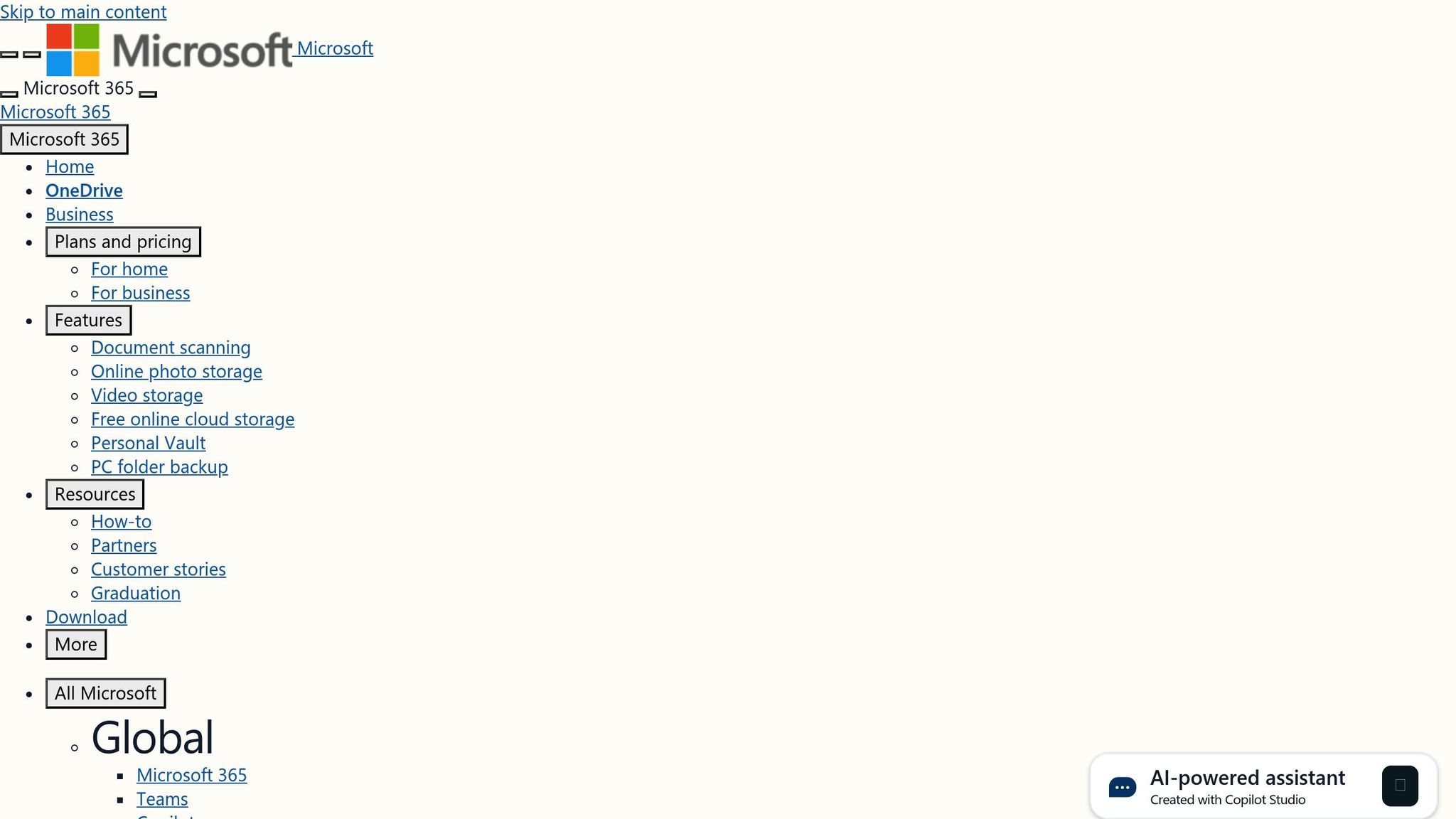
Microsoft OneDrive for Business offers flexible storage solutions tailored to meet the needs of small businesses, combining competitive pricing with built-in security features. Here's a breakdown of what you can expect:
Storage Capacity and Pricing
- OneDrive for Business Plan 1: Priced at $5.00 per user/month (billed annually), this plan provides 1 TB of storage per user and supports file uploads up to 250 GB.
- Plan 2: For $10.00 per user/month (billed annually), businesses get unlimited storage for teams with five or more users, starting with 5 TB per user.
- Microsoft 365 Business Plans:
- Business Basic: $6.00 per user/month (billed annually), includes 1 TB per user and essential productivity tools.
- Business Standard: $12.50 per user/month (billed annually), offering more robust productivity features alongside 1 TB per user.
- Business Premium: $22.00 per user/month (billed annually), combining advanced security features with 1 TB per user.
These pricing tiers provide businesses with the flexibility to scale storage as their needs evolve.
Security and Compliance
For businesses handling sensitive data, Plan 2 includes advanced security measures and compliance tools, ensuring that your information stays protected at all times.
2. Google Drive for Business
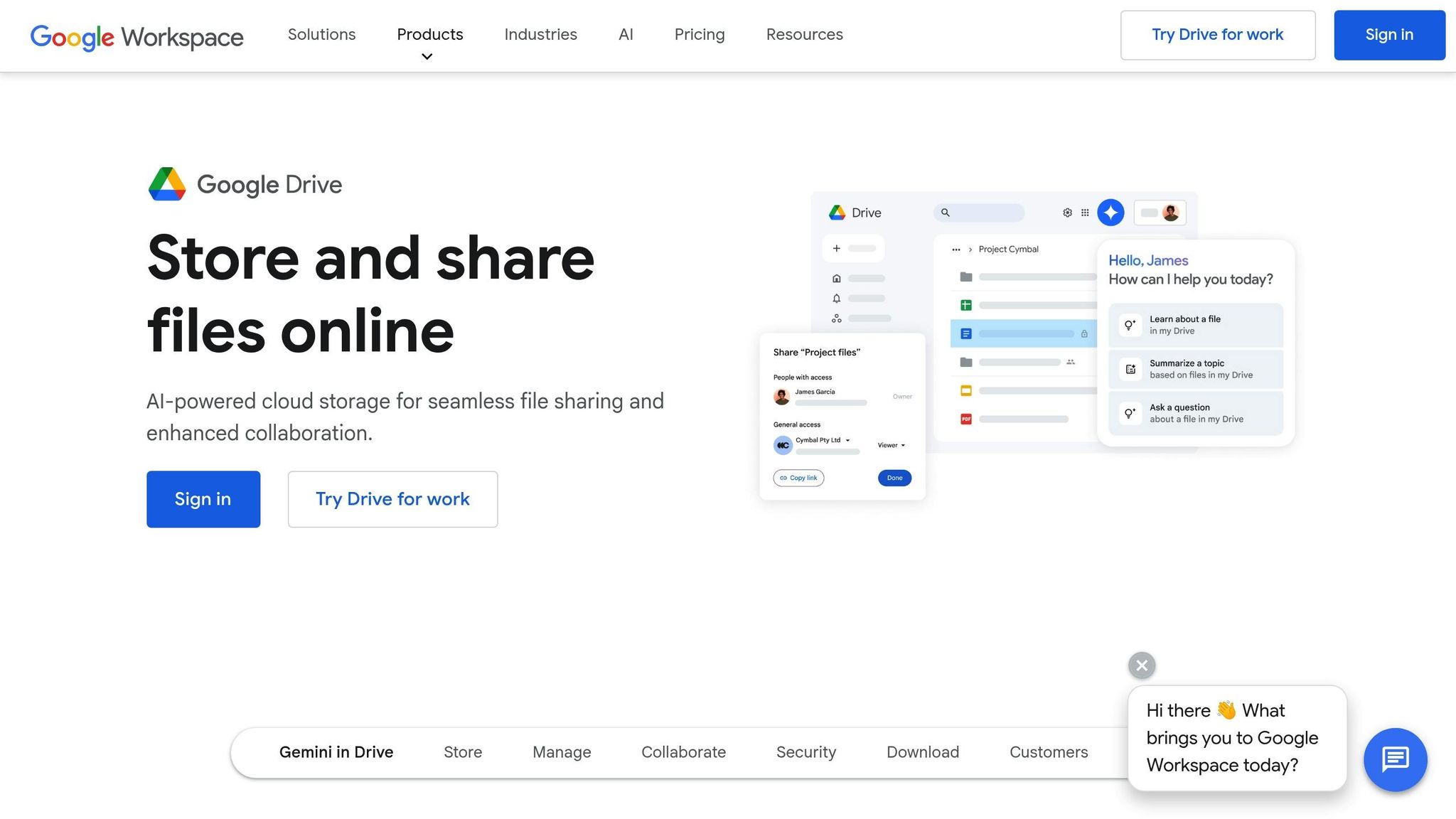
Google Drive for Business, part of Google Workspace, offers a dependable cloud storage solution tailored for small businesses. Its standout features include real-time collaboration and cross-platform accessibility, making it a go-to option for teams that value seamless integration and productivity.
Storage Capacity and Pricing
Google Workspace provides several plans to meet varying storage needs and budgets:
- Business Starter: At $6.00 per user/month (billed annually), this plan includes 30 GB of storage per user, covering Gmail, Drive, and Meet storage combined.
- Business Standard: For $12.00 per user/month (billed annually), users receive 2 TB of storage per person, ideal for growing teams.
- Business Plus: Priced at $18.00 per user/month (billed annually), this plan offers 5 TB of storage per user.
- Enterprise Plans: Starting at $20.00 per user/month, these plans include advanced security features and unlimited storage for organizations with at least five users.
Google Drive also supports file uploads up to 5 TB per individual file, making it a practical choice for businesses handling large-scale media files or databases.
Security and Compliance
Security is a top priority for Google Drive for Business. It employs enterprise-level protections like two-factor authentication, phishing protection, and data loss prevention. The platform adheres to key industry standards, including SOC 2, ISO 27001, and HIPAA, ensuring compliance for businesses in regulated industries like healthcare.
All files are encrypted both in transit and at rest using 256-bit SSL/TLS encryption. Administrators can manage sharing permissions, set access controls, and review audit logs to track file activity organization-wide. The Vault feature, available in higher-tier plans, supports eDiscovery and legal hold, which are essential for businesses with strict regulatory needs.
Collaboration Features
Collaboration is where Google Drive for Business shines. Teams can work on documents, spreadsheets, and presentations in real time, with changes syncing instantly across devices. The revision history feature tracks every edit, allowing users to restore previous versions if needed.
The platform also includes smart suggestions and AI-powered tools to boost efficiency. These features organize files automatically, suggest relevant documents, and offer grammar and style recommendations in Google Docs. The built-in commenting system enables in-document feedback and task assignments, streamlining team communication.
Remote Access and Device Compatibility
Google Drive for Business is compatible with Windows, macOS, iOS, and Android, ensuring access across all major platforms. The Drive File Stream desktop app lets users interact with cloud files directly from their computer’s file explorer without taking up local storage.
For those on the go, offline access keeps workflows uninterrupted even without an internet connection. Mobile apps include features like document scanning, voice typing, and offline editing, making it an excellent choice for remote teams or field workers who need reliable access to their files anytime, anywhere.
sbb-itb-d1a6c90
3. Dropbox Business
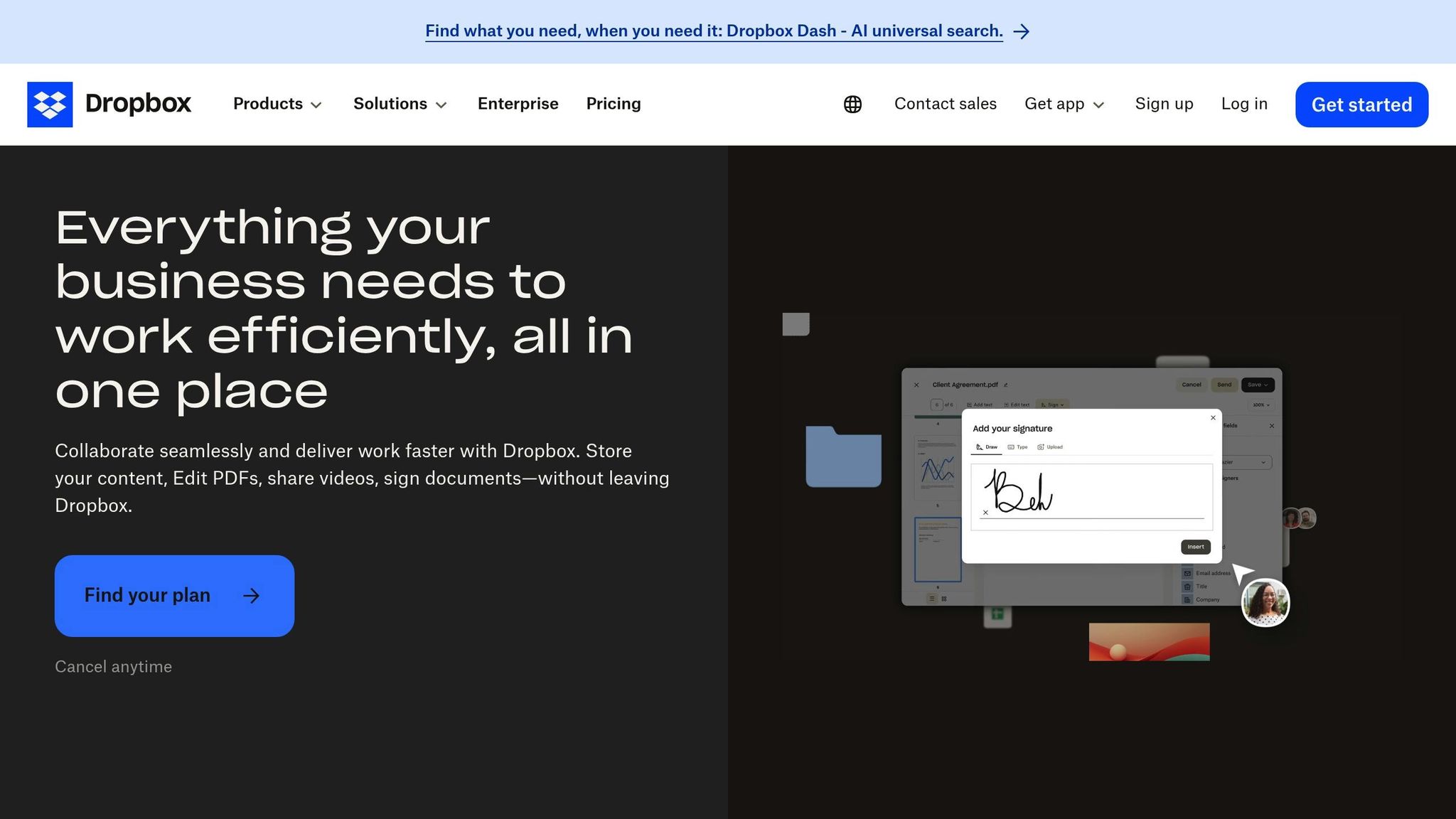
Dropbox Business provides dependable file syncing and secure tools for team collaboration. While its pricing is on the higher side compared to some competitors, the storage flexibility and advanced management features it offers can make it a smart choice for many organizations.
Storage Capacity and Pricing
Dropbox Business offers several plans tailored to different team needs:
- Business Standard: Costs $15 per user/month when billed annually, or $18 per user/month if billed monthly. This plan includes 5 TB of shared team storage and requires at least three users.
- Business Advanced: Priced at $24 per user/month annually or $30 per user/month monthly. It starts with 15 TB of team storage and also requires a minimum of three users.
- Enterprise: Custom pricing is available for larger organizations, offering scalable storage and user options.
For smaller teams or individuals, Dropbox also offers an Essentials plan with 3 TB of storage for $16.58/month (billed annually). However, business plans mandate at least three users.
Security and Compliance
Dropbox Business meets important compliance standards like SOC 2, HIPAA, and GDPR. For businesses in highly regulated industries, the Advanced and Enterprise plans include extra governance tools such as legal holds and advanced sharing controls, which can be crucial for managing sensitive data.
Collaboration and Accessibility
Dropbox Business is built to boost team efficiency with seamless file sharing and robust version control. It supports access across multiple devices, from desktops to smartphones, ensuring everyone on the team can stay connected and up to date with their work.
4. Box
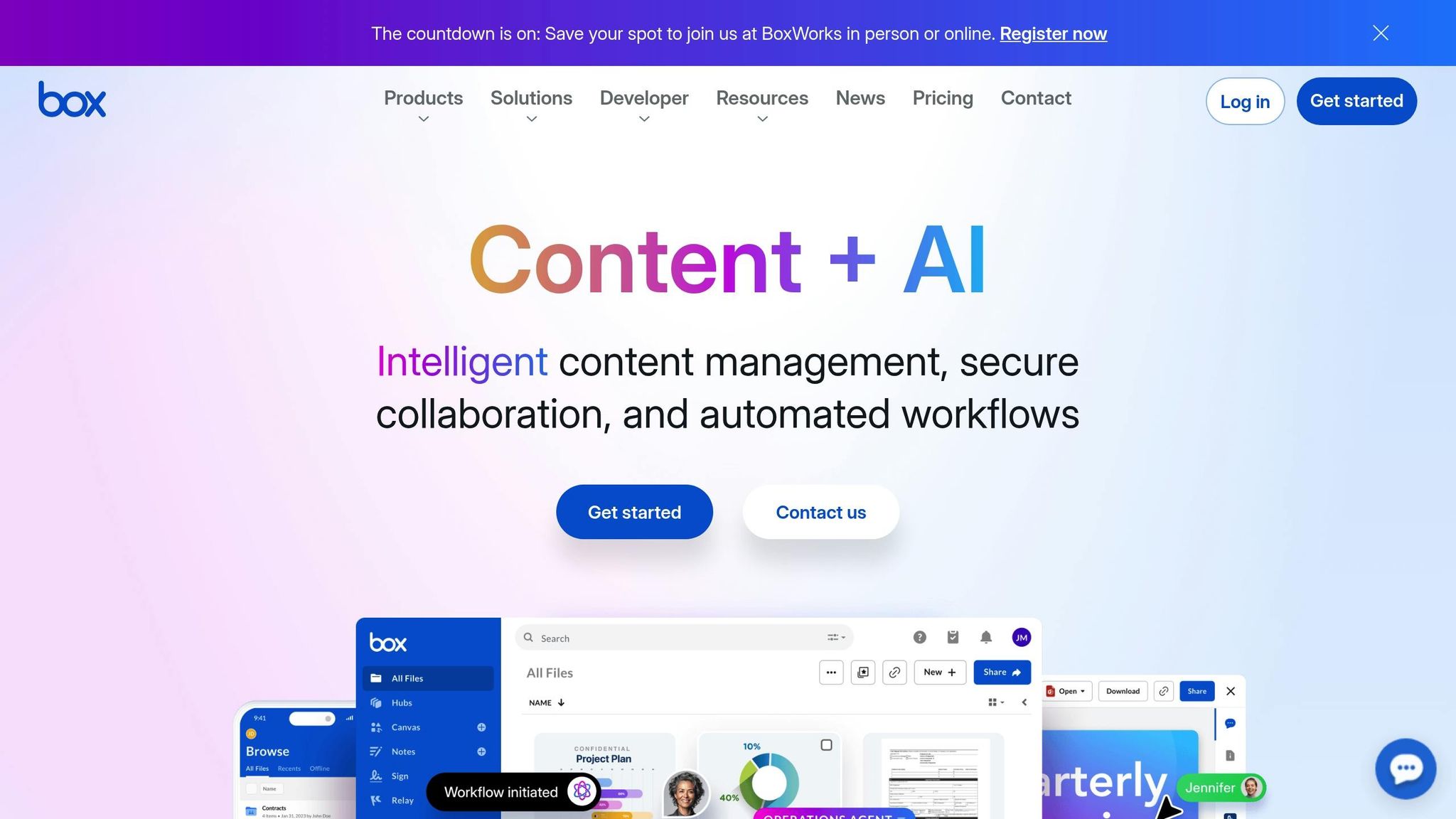
Box is a cloud storage platform designed with security and compliance at its core, making it a strong choice for small businesses that work in regulated industries or handle sensitive client data. Unlike storage solutions aimed at individual users, Box tailors its features for businesses that require professional-grade tools and enterprise-level functionality.
Storage Capacity and Pricing
Box keeps its pricing simple, offering three main business plans to suit varying team needs. The Business plan, priced at $15 per user per month (billed annually), includes 100 GB of storage per user. For teams requiring more capacity and security, the Business Plus plan costs $25 per user per month and provides unlimited storage along with advanced security features.
For businesses working with tighter budgets, the Starter plan is available at $5 per user per month, offering 100 GB per user but with limited collaboration tools. This plan is a good entry point for solo entrepreneurs or small teams since it doesn’t require a minimum number of users.
The unlimited storage offered in the Business Plus plan is a game-changer for teams dealing with large files - like marketing agencies, design firms, or professional service providers managing extensive client documentation. These pricing tiers, combined with Box's emphasis on security, make it a flexible and reliable option for businesses of all sizes.
Security and Compliance
When it comes to security, Box delivers features that are often out of reach for smaller businesses due to cost. It complies with critical standards like HIPAA, SOX, and FedRAMP, making it an excellent choice for organizations in healthcare, finance, or government contracting.
Box also offers granular file permission controls, allowing you to define exactly how each team member interacts with shared files. Permissions can be set for viewing, editing, downloading, or sharing on a per-file basis. Detailed audit trails keep track of all file activity, which is especially helpful during compliance audits or security reviews.
Additional protections like watermarking and link expiration ensure sensitive files remain secure. For example, you can watermark shared documents with recipient details or set expiration dates for shared links to ensure temporary access only.
Collaboration Features
Box doesn’t just focus on security - it also helps teams work smarter. Its real-time collaboration tools allow multiple users to edit documents simultaneously, with all changes tracked and attributed to specific individuals. Integration with Microsoft Office 365 and Google Workspace means teams can edit files directly within Box, eliminating the need to download and re-upload documents.
With Box Notes, teams gain a shared workspace for brainstorming, taking meeting notes, and collaborating on projects in real time. This feature is particularly useful for project planning or working with external partners, as collaborators don’t need full Box accounts to contribute.
To further streamline workflows, Box includes task assignment and automation tools. You can set up approval workflows for documents, route files to specific team members, and create notifications for key project milestones, saving time and reducing manual effort.
Remote Access and Device Compatibility
Box ensures that teams stay connected and productive, no matter where they are. It offers native apps for iOS, Android, Windows, and macOS, delivering a consistent experience across all devices. This is especially valuable for businesses with remote employees or teams that frequently travel.
The Box Drive feature integrates cloud storage directly into your computer’s file system, making cloud files accessible and manageable just like local files. Offline access adds another layer of convenience - team members can mark files for offline use, make edits, and sync changes once they’re back online. This functionality is a lifesaver for field workers, sales teams on the move, or businesses in areas with unreliable internet connections.
5. Backblaze Business Backup
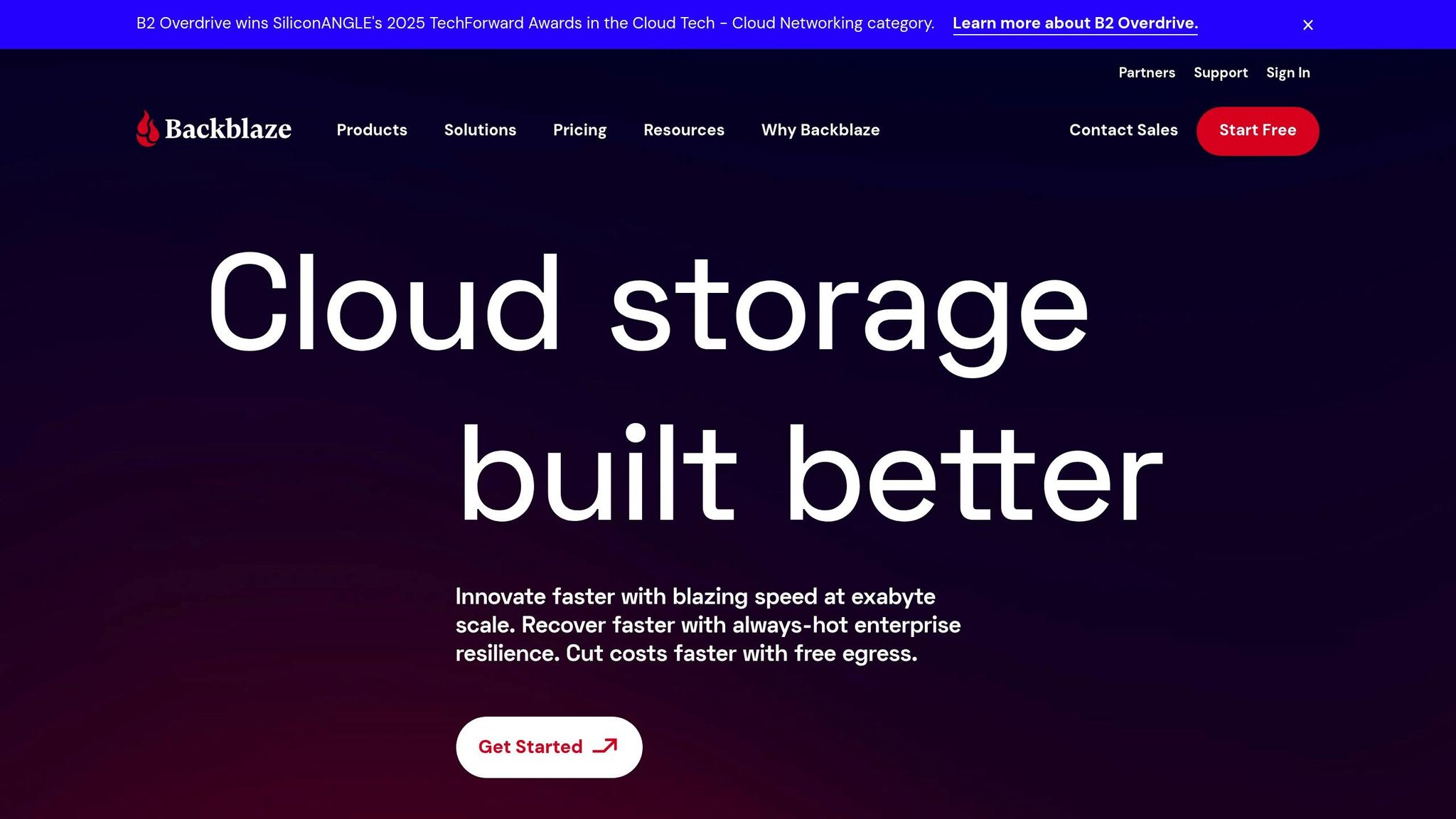
Backblaze Business Backup focuses on safeguarding your business data through automated backups rather than file sharing or collaboration tools. Its primary goal is to ensure data protection and disaster recovery, making it an excellent choice for businesses that prioritize security and reliability.
Storage Capacity and Pricing
Backblaze offers unlimited backup storage for just $60 per computer per year, regardless of how much data you need to back up. This straightforward pricing model makes it easy to plan for your business's data protection needs without worrying about exceeding storage limits.
Security and Compliance
To keep your data safe, Backblaze employs AES 256-bit encryption during both transmission and storage. All files are encrypted before leaving your computer, ensuring they remain inaccessible to unauthorized parties. For added security, businesses can set a private encryption key. However, it's important to note that losing this key makes your data permanently unrecoverable.
Backblaze also meets SOC 2 Type II compliance standards, which is particularly valuable for businesses in regulated industries. Its data centers are equipped with redundant power systems, climate control, and 24/7 physical security monitoring. Additionally, data is stored across multiple geographic locations, ensuring availability even during regional outages or disasters.
Remote Access and Device Compatibility
Backblaze supports both Windows and Mac computers with lightweight applications that run quietly in the background, continuously detecting and backing up new files without slowing down your system. You can access your backed-up files from any device with an internet connection using Backblaze's web-based restore interface. This allows you to browse your archive, preview files, and download individual documents or entire folders as needed.
For businesses needing to recover large amounts of data quickly, Backblaze offers a physical drive restoration service. They’ll ship a hard drive containing your backup directly to you for $189, with free return shipping. If you send the drive back within 30 days, you’ll receive a full refund, making this a practical option for fast, large-scale data recovery.
Feature Comparison Chart
Here's a quick side-by-side look at key features offered by popular business storage and backup services, tailored for small businesses:
| Feature | Microsoft OneDrive for Business | Google Drive for Business | Dropbox Business | Box | Backblaze Business Backup |
|---|---|---|---|---|---|
| Storage Limits | Varies by plan; includes scalable options | Varies by plan; modest entry-level spaces | Shared storage that scales with usage | Fixed or scalable storage options | Unlimited backup storage for recovery |
| Monthly Pricing | Competitive pricing tiers | Budget-friendly entry-level plans | Premium pricing for advanced needs | Flexible pricing structures | Per-device pricing for cost efficiency |
| Security Features | Advanced encryption and threat protection | Strong security with two-factor authentication | Encryption with remote management | Customizable permissions and robust security | Encrypted backups with compliance standards |
| Team Collaboration | Integrates seamlessly with Microsoft tools | Real-time editing and collaboration | Designed for creative workflows | Workflow automation and approval tools | Focused on backup and recovery, no collaboration tools |
| Remote Access | Web, mobile, desktop apps; offline access | Multi-platform with offline features | Smart syncing across devices | Secure access via desktop and mobile apps | Web-based interface for easy restoration |
| Best For | Businesses using Microsoft Office tools | Teams already on Google Workspace | Creative teams needing advanced sharing | Organizations with strict security needs | Businesses prioritizing backup and disaster recovery |
Each service in the chart caters to specific business needs, making it easier to find one that fits your priorities. For example:
- Microsoft OneDrive and Google Drive are ideal for businesses already using their respective ecosystems, offering scalable storage and affordable pricing.
- Dropbox shines for creative teams needing advanced file-sharing and collaboration tools.
- Box is perfect for businesses requiring top-notch security and compliance features.
- Backblaze Business Backup focuses solely on dedicated backup and disaster recovery, with unlimited storage and per-device pricing.
Whether your priority is real-time collaboration with scalable storage or reliable backup and recovery, these options offer robust security and tailored features to meet your business needs. Use this chart to align your choice with your specific goals.
Conclusion
To wrap things up, let’s revisit the key takeaways to help you make a well-informed decision. Picking the right cloud storage solution can make a world of difference in your day-to-day operations. Features like secure data storage ensure your critical information is safe from hardware failures and cyber threats, while remote access empowers your team to stay productive - whether they’re working from home, on the road, or spread across various locations.
Keep in mind that each platform caters to different needs. Whether your focus is on integrating with Microsoft Office, leveraging Google Workspace, sharing creative files, meeting strict compliance standards, or ensuring reliable backups, there’s a tool designed to fit your requirements. Your choice should align with your current tools, how your team collaborates, and, of course, your budget.
Ultimately, the right cloud storage solution lays the groundwork for smoother operations and long-term business growth. Look for a platform that simplifies workflows, reduces IT challenges, and supports your goals.
Take advantage of free trials to test these platforms and find the one that fits your business like a glove.
FAQs
What should I consider when choosing the best cloud storage tool for my small business?
When choosing a cloud storage solution for your small business, it's important to focus on a few critical factors: ease of use, security, scalability, and transparent pricing. These elements help ensure the tool meets your needs without adding unnecessary hurdles or hidden costs.
Start by considering your specific requirements. What types of files will you store? Do you need tools for team collaboration? Is it essential for the storage platform to integrate smoothly with the software you're already using? These questions can guide your decision-making process.
Security should also be a top priority. Look for features like encryption - both while data is stored and during transfer - to safeguard sensitive information.
By carefully assessing these factors, you can find a cloud storage solution that not only supports your business operations but also makes your workflow more efficient.
What security features should I look for in a cloud storage solution for my small business?
When selecting a cloud storage service for your small business, make sure encryption is a top priority. Your data should be encrypted both during transfer and while stored, reducing the risk of unauthorized access. Pair this with multi-factor authentication (MFA) to add an extra layer of security for account logins, and enforce strict access controls to ensure only approved team members can view or edit sensitive files.
It's also wise to choose a provider that performs regular security audits and adheres to recognized industry standards like SOC 2 or ISO 27001. These practices not only protect your data from cyber threats but also help your business stay compliant with data protection laws - something that's especially critical for growing companies in the U.S.
How can I make sure the cloud storage platform I choose works well with my current business tools and systems?
When selecting a cloud storage platform, it's important to ensure it works seamlessly with the tools you already rely on. Look for platforms that support APIs and are compatible with widely used software in your business. Many providers emphasize their integration features, so check if they connect with your productivity apps, document management systems, or other essential tools.
Before making a choice, take a close look at your current tech setup to pinpoint your specific requirements. Opting for a platform that fits well with your workflows can simplify operations, enhance collaboration, and minimize the need for manual fixes.


